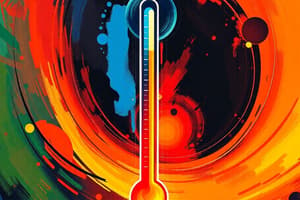Podcast
Questions and Answers
What does temperature measure in thermodynamic terms?
What does temperature measure in thermodynamic terms?
- The speed of light particles
- The degree of disorder in a substance (correct)
- The potential work a system can do
- The amount of available energy in a system
How does a higher temperature affect particle movement?
How does a higher temperature affect particle movement?
- Slows down particle movement
- Increases chaos among particle movement (correct)
- Leads to the formation of crystals
- Causes freezing of particles
Which term is often associated with 'disorder' in a system?
Which term is often associated with 'disorder' in a system?
- Enthalpy
- Specific heat
- Adiabatic process
- Entropy (correct)
In thermodynamics, what does entropy describe?
In thermodynamics, what does entropy describe?
How does entropy change between two blocks of solid ice in different parts of a room over time?
How does entropy change between two blocks of solid ice in different parts of a room over time?
What does a lower temperature indicate in terms of particle movement?
What does a lower temperature indicate in terms of particle movement?
Which law of thermodynamics states that heat always flows spontaneously from a hotter to colder body until equilibrium is reached?
Which law of thermodynamics states that heat always flows spontaneously from a hotter to colder body until equilibrium is reached?
What does the Third Law of Thermodynamics describe as the temperature approaches absolute zero?
What does the Third Law of Thermodynamics describe as the temperature approaches absolute zero?
Which field uses thermodynamics to study life cycles, metabolic pathways, and cellular processes?
Which field uses thermodynamics to study life cycles, metabolic pathways, and cellular processes?
In thermodynamics, what does the First Law of Thermodynamics (Law of Conservation of Energy) state?
In thermodynamics, what does the First Law of Thermodynamics (Law of Conservation of Energy) state?
Which law of thermodynamics deals with the concept that if two bodies are both in thermal equilibrium with a third body, then they are in equilibrium with each other?
Which law of thermodynamics deals with the concept that if two bodies are both in thermal equilibrium with a third body, then they are in equilibrium with each other?
Where is the application of thermodynamics crucial for analyzing mechanisms related to global warming?
Where is the application of thermodynamics crucial for analyzing mechanisms related to global warming?
Study Notes
Thermodynamics - Understanding Energy, Temperature, and Entropy
Thermodynamics is a fundamental branch of physics that deals with energy, temperature, and heat. It's concerned with how systems interact when they exchange or transfer energy from one form to another through work or heat. At its core, thermodynamics seeks to explain the behavior of physical systems by understanding their energetic interactions. Here, we will explore some key concepts in thermodynamics.
Temperature
Temperature is a measure of hotness or coldness associated with the average kinetic energy of particles within a system. In thermodynamic terms, it measures the degree of disorder in a substance or object. A higher temperature indicates more chaos among particle movement, while lower temperatures indicate slower movement and thus less chaotic activity.
Entropy
Entropy is often known as 'disorder', and describes the amount of available energy in any system that can do useful work. For example, consider two blocks of solid ice in different parts of a room—one near the radiator where it gradually melts due to heat transfer, turning into water; the other remains frozen next to a window where there isn’t enough warmth to cause this transition. This is because the entropy within each block has changed over time: The first block gained random motion and potential energy; meanwhile, the second block lost some orderliness with respect its structure without becoming colder overall.
Laws of Thermodynamics
There are four laws that define the principles of thermodynamics:
- Zeroth Law of Thermodynamics: If two bodies are both in thermal equilibrium with a third body, then all three are in thermal equilibrium with each other.
- First Law of Thermodynamics (Law of Conservation of Energy): Energy cannot be created nor destroyed, only converted between forms such as mechanical, electrical, chemical, etc..
- Second Law of Thermodynamics: Heat always flows spontaneously from a hotter to colder body until equilibrium is reached. Also, entropy increases in any process occurring naturally on Earth.
- Third Law of Thermodynamics: As the temperature approaches absolute zero (-273°C), the molecular vibrations slow down until the point there are none left, resulting in perfect organization and stability.
Applications of Thermodynamics
Thermodynamics is used widely across various fields beyond just its study of basic phenomena like heat flow or cooling processes:
- Engineering: Designing efficient engines, turbines, refrigerators, heat exchangers, etc., requires knowledge of thermodynamics.
- Chemistry: Determine suitable conditions and reaction rates for reactions involving thermal change, e.g., synthesis, decomposition, combustion, etc.
- Biology: Studying life cycles, metabolic pathways, cellular respiration, photosynthesis, etc.
- Climate Change: Analyzing global warming mechanisms caused by greenhouse gases emission impacting atmospheric temperature changes.
In summary, thermodynamics provides us valuable insights into how our world works on both macroscopic and microscopic levels. By understanding these principles better, we have been able to develop technologies and systems that allow us to manipulate matter and energy effectively.
Studying That Suits You
Use AI to generate personalized quizzes and flashcards to suit your learning preferences.
Description
Explore key concepts in thermodynamics such as energy, temperature, entropy, and the laws that govern these phenomena. Learn about the practical applications of thermodynamics in engineering, chemistry, biology, and climate change research.




